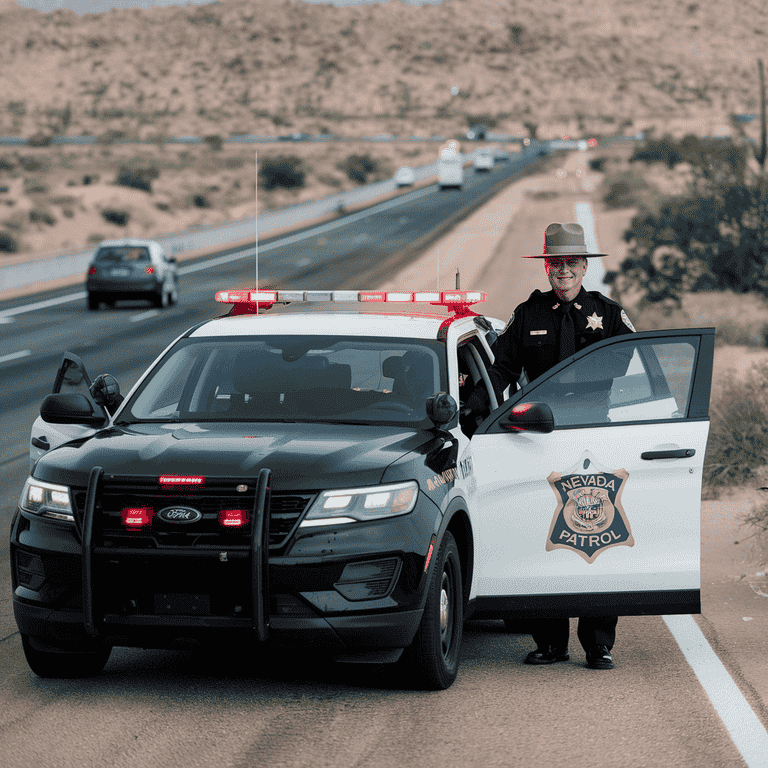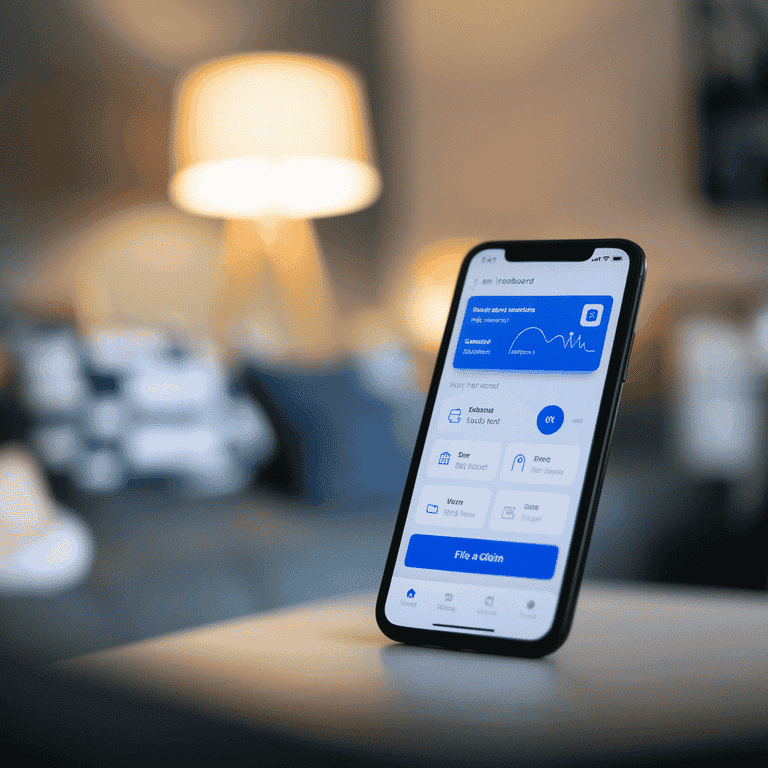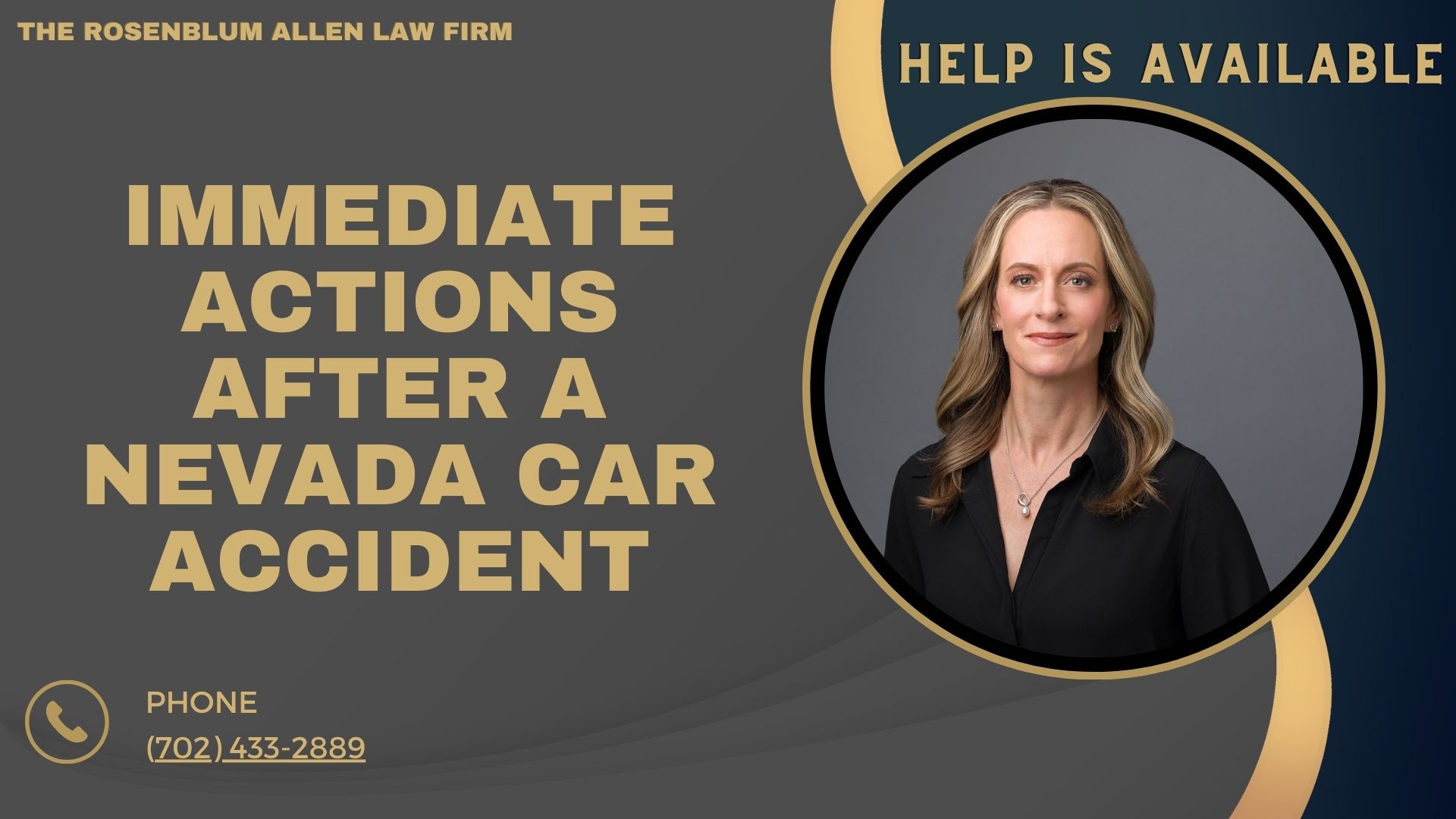Ensure Safety First
Your safety and the safety of others should be your top priority after an accident. Here’s what you need to do:Check for Injuries
Take a deep breath and assess yourself for injuries. Then, if it’s safe to do so, check on your passengers and other involved parties.Call 911 for Medical Assistance
If anyone is injured, even slightly, don’t hesitate to call 911. It’s always better to err on caution regarding health and safety.Move to a Safe Location
If your vehicle is drivable and it’s unsafe to remain where you are, carefully move to the side of the road or a nearby parking lot.Turn on Hazard Lights
Don’t forget to turn on your hazard lights. This simple action can prevent further accidents by alerting other drivers.
Contact Law Enforcement
Once you’re safe, it’s time to get the authorities involved.When to Call the Police
In Nevada, you’re required to call the police if:- There are injuries
- The accident is blocking traffic
- There’s significant property damage
Cooperate with Officers
When the police arrive, be polite and cooperative. They’re there to help and document the situation.Provide Accurate Information
Tell the officers exactly what happened to the best of your recollection. Stick to the facts and avoid speculating or admitting fault.Document the Accident Scene
While waiting for the police, start gathering evidence. This can be crucial for insurance claims and potential legal proceedings.Take Photos and Videos
Use your smartphone to capture the scene. Remember, more is better when it comes to documentation.Vehicle Damage
Take clear, well-lit photos of all vehicles involved, focusing on:- Damage areas
- License plates
- Overall vehicle positioning
Road Conditions
Document the road conditions that might have contributed to the accident:- Weather conditions
- Road hazards
- Skid marks
Traffic Signs and Signals
Don’t forget to photograph any relevant traffic signs or signals. These can be important in determining fault.Gather Witness Information
If there are witnesses, their accounts can be invaluable.Obtain Contact Details
Politely ask witnesses for their:- Names
- Phone numbers
- Email addresses

Exchange Information
Now that you’ve documented the scene, it’s time to swap details with the other driver. This might feel awkward, but remember, it’s a normal part of the process.Driver’s Details
Approach the other driver calmly. A friendly “Are you okay?” can help break the ice. Then, exchange the following information:Name and Contact Information
Get the basics:- Full name
- Phone number
- Email address
- Home address
Insurance Company and Policy Number
Insurance details are crucial. Make sure you get:- Name of their insurance company
- Policy number
- Insurance agent’s contact info (if available)
Vehicle Information
Don’t forget about the cars involved!Make, Model, and License Plate Number
Jot down:- Car make (e.g., Toyota, Ford)
- Model (e.g., Camry, F-150)
- Year
- Color
- License plate number

Notify Your Insurance Company
It’s time to loop in your insurance provider. Don’t worry; they’re here to help!Report the Accident Promptly
Most insurance companies have 24/7 claim hotlines. Give them a call as soon as you’re safe. They’ll guide you through the following steps.Provide Accurate Details
Your insurance agent will ask for information about the accident. Here’s what to keep in mind:- Stick to the facts
- Be honest about what happened
- Describe the damage to your vehicle
- Mention any injuries, even minor ones
Avoid Admitting Fault
Here’s a crucial tip: never admit fault, even if you think you caused the accident. The fault is a complex legal issue that your insurance company and potentially the courts will determine.Seek Medical Attention
Your health is priceless. Don’t neglect it after an accident.Even for Minor Injuries
Some injuries aren’t immediately apparent. What seems like a slight twinge could develop into something more serious later. It’s always better to get checked out. Consider visiting:- Your primary care physician
- An urgent care center
- The emergency room for more severe injuries
Keep Medical Records
If you do seek medical attention, keep a detailed record of:- Doctor visits
- Treatments received
- Medications prescribed
- Any follow-up appointments

Follow Up
The dust has settled, but your work isn’t entirely done. Following up is crucial to ensure everything is handled correctly. Let’s break it down into manageable steps.With Insurance Companies
Insurance companies are there to help, but sometimes they need a little nudge. Here’s how to stay on top of things:- Set reminders to check in weekly
- Keep a log of all conversations
- Ask for email summaries of phone calls
With Medical Providers
Your health is a priority, so stay on top of your medical care:- Attend all follow-up appointments
- Keep a symptom diary
- Ask for copies of all medical records
With Your Attorney
If you’ve hired an attorney, maintaining good communication is vital:- Respond promptly to their requests
- Update them on any new developments
- Ask questions if you’re unsure about anything

Breaking It All Down For You
As you hit the roads of Nevada, carry this knowledge with you. It’s more than just a guide—it’s a toolkit for turning a stressful situation into a manageable process. And remember, while we’ve covered the legal and practical aspects, don’t forget to take care of your emotional well-being too. Reach out to friends, family, or professionals if you need support.
Drive safely, stay vigilant, and enjoy the beautiful roads of Nevada. And if the unexpected happens, take a deep breath and remember: you’ve got this!

Frequently Asked Questions
What should I do if the other driver doesn’t have insurance?
You should still exchange contact details and document the accident scene if the other driver is uninsured. Then, contact your own insurance company. If you have uninsured motorist coverage, it may help cover your damages. It’s also a good idea to consult with an attorney to explore your options for recovering costs.
How long do I have to file a car accident claim in Nevada?
In Nevada, the statute of limitations for filing a personal injury claim after a car accident is generally two years from the accident date. For property damage claims, you typically have up to three years. However, it’s best to file as soon as possible to avoid complications.
Do I need to report every car accident to the DMV?
No, not every accident needs to be reported to the DMV. You are required to file a report if there are injuries or if property damage exceeds $750. If in doubt, it’s safer to file the report within 10 days of the accident.
Can I settle a car accident without involving insurance?
While settling minor accidents privately is technically possible, it’s risky. Without an official record, you may be vulnerable if the other party later claims additional damages or injuries. It’s usually better to involve your insurance company for proper documentation and protection.
What happens if I don’t file a DMV report after an accident?
Failing to file a required DMV report can lead to penalties, including fines and suspension of your driver’s license. Always ensure you meet Nevada’s reporting requirements within 10 days of the accident if necessary.
Can I still file a claim if I was partially at fault for the accident?
Yes, Nevada follows a “modified comparative negligence” rule. You can still recover damages if you are less than 50% at fault for the accident. However, your compensation will be reduced by the percentage of your fault.
What should I do if my car is totaled after an accident?
If your car is considered totaled (meaning repair costs exceed its value), your insurance company will likely offer a payout based on the vehicle’s market value before the accident. You can negotiate this amount if you believe it’s too low or provide evidence that your car is worth more.
Should I go to the doctor even if I feel fine after an accident?
Yes, seeking medical attention after an accident is always recommended, even if you feel fine. Some injuries, like whiplash or internal injuries, may not show symptoms immediately but could become serious later on.
Can passengers in my vehicle also file claims after an accident?
Yes, passengers injured in a car accident can file claims against the at-fault driver’s insurance policy (whether you or another driver). Depending on coverage, they may also be able to access compensation through their insurance policies.
What should I do if my insurance claim is denied?
If your claim is denied, request a written explanation from your insurance company. You can appeal the decision by providing additional evidence or documentation that supports your claim. If you’re still facing difficulties, consulting with an attorney might be necessary to explore legal options for challenging the denial.

Glossary
Accident Report: A formal document detailing the facts of a car accident, typically filed with law enforcement or the DMV. It includes the date, time, location, and parties involved.
Comparative Negligence: A legal principle in Nevada that allows a party to recover damages even if they are partially at fault for an accident. However, their compensation will be reduced by their percentage of fault.
DMV Report: A report filed with the Nevada Department of Motor Vehicles (DMV) when an accident results in injury, death, or property damage exceeding $750. This report must be submitted within 10 days of the accident.
Fault: Legal responsibility for causing an accident. Determining fault is crucial for insurance claims and legal proceedings.
Insurance Claim: A formal request to an insurance company for compensation or coverage after an accident. Claims can include vehicle repairs, medical bills, and other related expenses.
Liability Coverage: A type of car insurance that covers damages or injuries you cause to others in an accident. It does not cover your own injuries or vehicle damage.
Personal Injury Claim: A legal action taken by someone injured in an accident to recover compensation for medical expenses, lost wages, and pain and suffering. In Nevada, personal injury claims must generally be filed within two years of the accident.
Police Report: An official document created by law enforcement officers who respond to the scene of an accident. It includes details about the crash and may indicate who was at fault.
Property Damage Claim: A claim filed with an insurance company to cover repairing or replacing property damaged in a car accident, such as a vehicle or personal belongings.
Statute of Limitations: The legal time limit within which a claim must be filed. In Nevada, this is typically two years for personal injury claims and three years for property damage claims related to car accidents.
Totaled Vehicle: A vehicle deemed a total loss because the repair cost exceeded its market value before the accident. In such cases, insurance companies usually offer a payout based on the car’s pre-accident value.
Uninsured Motorist Coverage (UM): An optional type of insurance coverage that protects you if you’re involved in an accident with a driver who doesn’t have insurance. This coverage can help pay for medical expenses and vehicle damage when the at-fault driver is uninsured.
Witness Statement: A written or verbal account from someone who saw the accident. Witness statements can determine fault and support insurance claims or legal actions.

More Resources for You
Molly Rosenblum, Esq., our esteemed lead attorney, has not only demonstrated unparalleled legal acumen but has also dedicated herself to creating a suite of comprehensive resources to assist those in need, particularly individuals grappling with personal injury cases. Each resource is thoughtfully curated to provide crucial information and guidance across various injury-related legal matters. Here’s a detailed overview of the valuable resources crafted by Molly Rosenblum, Esq.:
Las Vegas Personal Injury Attorney: Comprehensive legal guidance for individuals who have suffered personal injuries, ensuring they understand their rights and the compensation they may be entitled to. Learn more.
Las Vegas Car Accident Attorney: Specialized legal support for car accident victims, offering insights into navigating insurance claims and securing rightful compensation. Discover how to proceed.
Motorcycle Accident Lawyer Las Vegas: Dedicated resources for motorcycle accident victims, focusing on the unique challenges and legal nuances they face. Get informed.
Wrongful Death Lawyer Las Vegas: Compassionate and professional legal assistance for families dealing with the devastating loss of a loved one due to wrongful death. Understand your rights.
Truck Accident Attorney Las Vegas: Effective legal advice for individuals involved in truck accidents, addressing the complexities of commercial vehicle regulations and liability issues. Explore your legal options.
Las Vegas Drunk Driving Accident Attorney: Specialized support for victims of drunk driving accidents, ensuring they navigate the legal system effectively to secure justice and compensation. Learn about your recourse.
Molly Rosenblum, Esq. is committed to providing accessible, detailed, and empathetic legal support to those affected by personal injuries. Each resource she has created serves as a testament to her dedication and expertise, ensuring that individuals are well-informed and prepared to pursue justice and rightful compensation.

Offsite Resources You May Find Helpful
Here are some suggested offsite resources related to steps after a car accident that readers may find useful:
Nevada DMV: Nevada’s official accident report form.
Nevada Division of Insurance: State resource on auto insurance laws and requirements.

A Special Message from the Author, Our Lead Attorney

Molly Rosenblum, Esq
I extend my sincere thanks for taking the time to review these resources. I understand that navigating the aftermath of a car accident can be overwhelming and complex. That’s why I’m committed to providing comprehensive information to help you understand your rights and the available legal options.
Remember, you don’t have to go through this journey alone. My team and I are here to help you every step of the way. We’re dedicated to fighting for justice and fair compensation for our clients.
If you find yourself in need of legal assistance, please don’t hesitate to reach out. I invite you to schedule a free consultation with my team. This is an opportunity for us to discuss your situation, answer your questions, and explore how we can best assist you.
Please call (702) 433-2889 to set up your consultation. My team and I look forward to the opportunity to serve you.
Warm regards,
Molly Rosenblum, Esq.





